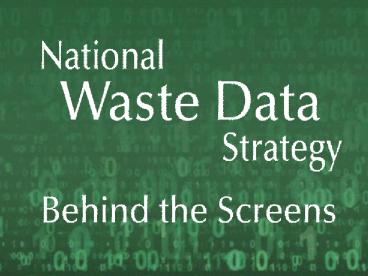National Waste Data Strategy Presentation Content - PowerPoint PPT Presentation
1 / 19
Title:
National Waste Data Strategy Presentation Content
Description:
The waste industry is changing rapidly. There is going to be much ... Rubbish IN = Rubbish OUT. The quality of the output depends on the quality of the input ... – PowerPoint PPT presentation
Number of Views:120
Avg rating:3.0/5.0
Title: National Waste Data Strategy Presentation Content
1
(No Transcript)
2
National Waste Data StrategyPresentation Content
- The Challenge
- The Problem
- The Panel and Objectives
- The Systems
- Classifications
- Electronic Reporting
- Phases
- Potential
- Summary
- Credits
3
The Challenge
- The waste industry is changing rapidly
- There is going to be much less of this. . .
4
And much more of this . . .
5
So new facilities will be needed
- Where ?
- How many ?
- What kind ?
6
So new facilities will be needed
- Where ?
- How many ?
- What kind ?
To answer these questions we need information
7
The Problem
- Information is available BUT there is
- Lack of accuracy
- Insufficient detail
- Inconsistent classification
- Lack of codes
- Confusion over terminology
- Ageing data
IF YOU CANT MEASURE IT YOU CANT MANAGE IT
8
Data Advisory Panel established to address the
problem
- Objective TO PROVIDE NATIONAL WASTE DATA
COLLECTION AND DISSEMINATION SYSTEM - Include all waste streams (except radioactive)
- Meet the needs of all stakeholders
- Apply UK wide with staged implementation
- Provide up to date, quantitative data
9
National Waste Data Strategy
- The new strategy will
- Pull together existing waste data via a Data
Warehouse (or hub) - Build an integrated system
- Allow users to access and download reports
- Enable users to model data to create further
reports for policy making, target setting,
planning, forecasting, monitoring and decision
making
10
The Systems
Primary Waste Data Collection Systems
WDF
REGIS
RATS
HAZ
CORE REGS
GIS Data Set Repository
Weblinks
HUB Base Data Standard Reports
System Manager
Other Systems
Internet Browser USERS
11
- The Data Warehouse will enable data to be
- Accessed via Defra
- website
- Managed
- Disseminated
- Analysed
12
Rubbish IN Rubbish OUT
- The quality of the output depends on the quality
of the input - Therefore all data returns need to be timely,
accurate and complete - Quality IN Quality OUT
13
ClassificationsStandardisation and Consistency
EA guidance and Waste Thesaurus
- EWC to replace existing mix of codes and
classifications leading to consistent reporting
14
Improving Efficiency
- Benefits from Electronic Reporting
- Assistance through drop-down boxes and look-up
tables - Faster creation and processing of returns
- Real-time validation
- Information available sooner
15
Phases
- PHASE 1 - 2006
- Waste guidance and Thesaurus available from the
Agency to help develop a common language and
understanding - Browse, print and download ready made reports
- PHASE 2 - 2007
- Integration of GIS and spatial data
- Data available in Excel spreadsheets
- Consult Northern Ireland and Scotland on joining
the strategy - LATER
- Registration and different levels of authorised
access - Users able to create own reports
16
Potential
- Geographical Information System
- Manage waste as a resource
GIS Screens
17
SUMMARY
- More waste must be diverted from landfill
- To build new facilities for a sustainable economy
timely, accurate and consistent data is
essential - The National Waste Strategy will deliver this
data - Keys to success will be electronic reporting, EWC
codes and GIS
18
Acknowledgements
- Biffa Waste Services Ltd
- CBI (Confederation of British Industry)
- CIWM (The Chartered Institution of Wastes
Management) - CRN (Community Recycling Network)
- Defra Waste Strategy
- Defra Waste Implementation Programme (WIP)
- Defra ESI (Waste Statistics)
- Defra Waste Management
- DOENI (Department of the Environment in Northern
Ireland)
- DTI (Department of Trade and Industry)
- Environment Agency
- ESA (Environmental Services Association)
- GLA (Greater London Authority)
- ODPM (Office of the Deputy Prime Minister)
- RTAB (Regional Technical Advisory Bodies)
- SEPA (Scottish Environmental Protection Agency)
- The Scottish Executive
- WAG (Welsh Assembly Government)
- WRAP (Waste and Resources Action Programme)
19
The National Waste Data Strategyis supported by
- Defra
- Welsh Assembly Government
- Department of the Environment in Northern Ireland
- Scottish Executive
- The UK Environment Agencies
- The Chartered Institution of Wastes Management
This programme was developed under the guidance
of CIWM (EB) The Chartered Institution of Wastes
Management Environmental Body with funding from
the Defra WIP programme














![NOTE: To appreciate this presentation [and insure that it is not a mess], you need Microsoft fonts: PowerPoint PPT Presentation](https://s3.amazonaws.com/images.powershow.com/4925474.th0.jpg?_=20200820015)





![NOTE: To appreciate this presentation [and insure that it is not a mess], you need Microsoft fonts: PowerPoint PPT Presentation](https://s3.amazonaws.com/images.powershow.com/7010443.th0.jpg?_=20150809053)




![NOTE: To appreciate this presentation [and insure that it is not a mess], you need Microsoft fonts: Showcard Gothic, Ravie, Chiller and Verdana PowerPoint PPT Presentation](https://s3.amazonaws.com/images.powershow.com/3938257.th0.jpg?_=20130304077)


![NOTE: To appreciate this presentation [and insure that it is not a mess], you need Microsoft fonts: PowerPoint PPT Presentation](https://s3.amazonaws.com/images.powershow.com/4792164.th0.jpg?_=20131204098)


